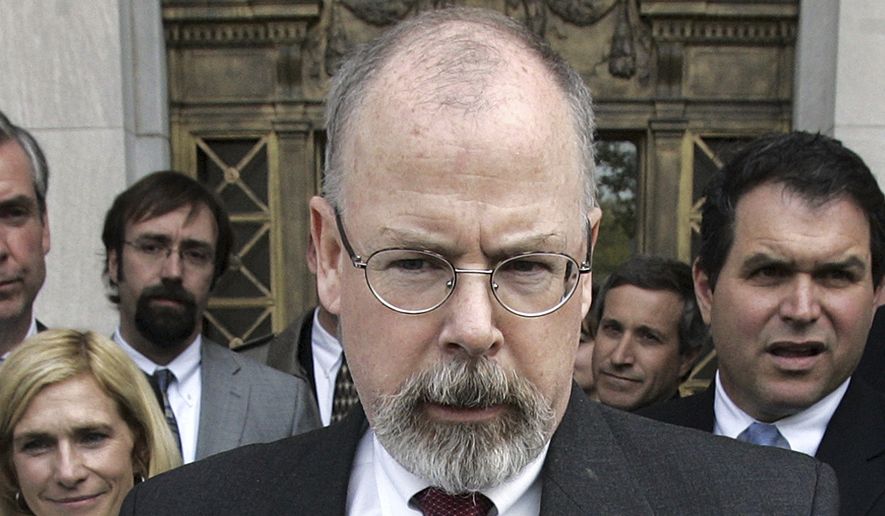The special prosecutor investigating the FBI’s Trump-Russia probe on Thursday charged a lawyer with ties to the Democratic National Committee and 2016 Democratic presidential nominee Hillary Clinton with lying to the FBI.
A federal grand jury returned a single felony count of making a false statement to the FBI against Michael Sussmann, a Washington attorney.
Special prosecutor John Durham alleges that Mr. Sussmann lied to FBI General Counsel James Baker during a September 2016 meeting.
The indictment said Mr. Sussmann falsely claimed he was not representing a client when he peddled allegations to the FBI that the Trump Organization was secretly communicating with Russia’s Alfa Bank.
Prosecutors said Mr. Sussmann in fact represented Mrs. Clinton’s 2016 presidential campaign and an unnamed tech executive when he spoke with the FBI.
Mr. Sussmann’s attorneys said their client never made such a statement. They also said there was no evidence the alleged false statement affected the FBI’s handling of the Russia collusion probe.
“Mr. Sussmann has committed no crime,” they said in a statement.
Mr. Sussmann, a partner at the Perkins Coie law firm, represented the DNC when Russia hacked its servers in 2016.
Perkins Coie also has ties to Fusion GPS, which hired British ex-spy Christopher Steele, who compiled a dossier of salacious, unverified allegations about former President Donald Trump and Russia.
During the meeting with Mr. Baker, Mr. Sussmann relayed data and analysis from a cybersecurity researcher who claimed that odd internet data was evidence of secret communications between the Trump Organization and Alfa, according to the indictment.
Mr. Baker told investigators he recalled Mr. Sussmann telling him that the meeting was not on the behalf of a client. Mr. Sussmann later testified to Congress in December 2017 that he met with the FBI on behalf of the cybersecurity expert.
Time was running out for Mr. Durham to charge Mr. Sussmann, as the five-year statute of limitations expires this weekend.
Mr. Sussmann’s lawyers insist they will prove their client’s innocence.
“Any prosecution would be baseless, unprecedented and an unwarranted deviation from the apolitical and principled way in which the Department of Justice is supposed to do its work,” the lawyers’ statement said.
The FBI concluded there was no merit to the allegations of secret communications between Trump and Alfa Bank. Special counsel Robert Mueller did not mention it in his massive report.
Mr. Durham acquired Perkins Coie’s billing records and found that Mr. Sussmann reportedly charged the time he spent on the Alfa Bank allegations to the Clinton campaign, The New York Times reported.
However, the hours he spent with Mr. Baker were not part of those billing records, according to the report.
Lawyers for Mr. Sussmann said the billing records are misleading because he was not charging the cybersecurity expert for his work but needed to show the firm internally that he was working on something.
The cybersecurity expert who Mr. Sussmann said he was representing has also hired a lawyer.
Mr. Durham was appointed in May 2019 by then-Attorney General William Barr to look for wrongdoing by the FBI and others in the early stages of the Trump-Russia collusion probe.
Initially, Mr. Durham, once the U.S. attorney for Connecticut, was reviewing the case as a federal prosecutor. Mr. Barr elevated him to special counsel in late 2020 so his work could continue uninterrupted under President Biden.
At first, the investigation was hailed by Mr. Trump as critical to getting to the bottom of how the FBI made so many mistakes in its Russia investigation.
By the probe’s second anniversary in May, it became popular among conservatives to mock it. Mr. Trump and other conservatives accused Mr. Durham of disappearing without uncovering anything.
The Durham probe previously produced a single criminal charge against former FBI attorney Kevin Clinesmith, who admitted to altering an email related to the surveillance of former Trump campaign aide Carter Page.
Clinesmith was sentenced to 12 months probation and 400 hours of jail time.
• Jeff Mordock can be reached at jmordock@washingtontimes.com.




Please read our comment policy before commenting.